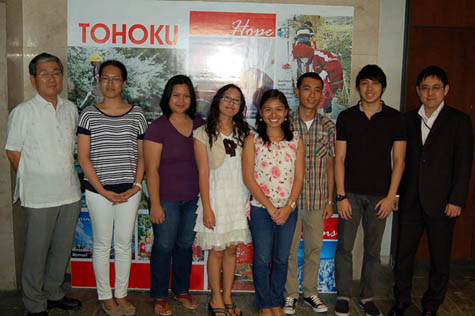Six Filipino Students to Leave for Japan Under the
Long-Term Invitation Program of the Kizuna Project

KIZUNA Project Long Term Program participants, together with JICC Director Kiyoshi Takeuchi
and Researcher/Adviser Mr. Shinichiro Kato during the pre-departure orientation
Six Filipino students are Japan-bound this September 9, 2012 for the “ Long-Term Invitation Program for University Students and Others from the ASEAN Countries and Four Other Countries ” under the Youth Exchange Project with Asia-Oceania and North America, or the ‘Kizuna Project' . This program is part of the Japanese reconstruction plans and aims at promoting global understanding of Japan's revival efforts in the wake of the Great East Japan Earthquake that occurred on March 11, 2011. The project will allow the participants to understand and experience first-hand the ongoing reconstruction efforts and recovery initiatives at disaster sites.
A pre-departure orientation was organized by the Japan Information and Culture Center (JICC) for the participants to prepare the students on what to expect from their stay in Japan. Director Kiyoshi Takeuchi, and Researcher/Adviser Mr. Shinichiro Kato, of JICC were both present during the orientation to answer questions from the participants.
The six university students hailing from different schools in the country will participate under the program's four categories:
Mr. Miles Justin Maranang, from De La Salle University, and Ms. Myrtle Anne, from the University of the Philippines Diliman, will be part of the “Field Work Program: Reconstruction after the Great East Japan Earthquake and Revitalization in the Region” in Iwate Prefecture and Miyage Prefecture, respectively. Both students will take part in the programs in which the Japan Overseas Cooperative Association (JOCA) is engaged in. They will also participate in earthquake recovery programs undertaken by the government, private businesses, private organizations, and all manner of groups, and experience hands-on study of recovery and industrial restoration efforts. Both students will stay in Japan until December 18, 2012.
Ms. Anna Patricia Saberon and Ms. Kristine Camia, both from the University of the Philippines Diliman, will be attending classes at the Hiroshima City University and Hiroshima University of Economics, respectively, until February 10, 2013. The students will be participating under the “ Study Program + Field Work Program: Human Resource Development for Peacebuilding and Reconstruction after the Great East Japan Earthquake and Industrial Restoration ” at Hiroshima Prefecture. Within Hiroshima, which has launched the “Hiroshima for Global Peace” Plan, the participants will experience hands-on study of the human resource development and international contribution initiatives carried out by local governments, universities, and private organizations, with universities in the city of Hiroshima as the center of operations.
Mr. Julius Ceasar of the University of the Philippines Los Banos, and Ms. Zoila Gerente of the University of the Philippines Diliman, will be working under the “Study Program + Field Work Program: Short-Term Study University Program to Learn Reconstruction Efforts after the Great East Japan Earthquake and Industrial Restoration” program. They will attend Tokyo University of Agriculture and Meiji Gakuin Daigaku, respectively, until February 10, 2013. Under this coursework, the participants will attend lectures in each subject at the designated universities.
All course works will be under the guidance of the Japan Overseas Cooperative Association (JOCA), while activities in disaster site reconstruction and related programs will be implemented by Japan International Cooperation Center (JICE).
The Ministry of Foreign Affairs of the Government of Japan has launched the Youth-Exchange Project with Asia-Oceania and North America, or the KIZUNA Project, for the youth for them to relay the current status of Japan's reconstruction efforts to the people of their respective countries through report presentations and other means of communicating their experience in the disaster-affected areas after returning to their home countries. Under the Kizuna Project, approximately 10,000 youths from the Asian/Oceanian regions, including 285 Filipinos , will have an opportunity to participate in specially designed programs. The project was approved by the Japanese Diet as a part of the third supplementary budget in November 2011, and will be implemented by the end of March 2013.
